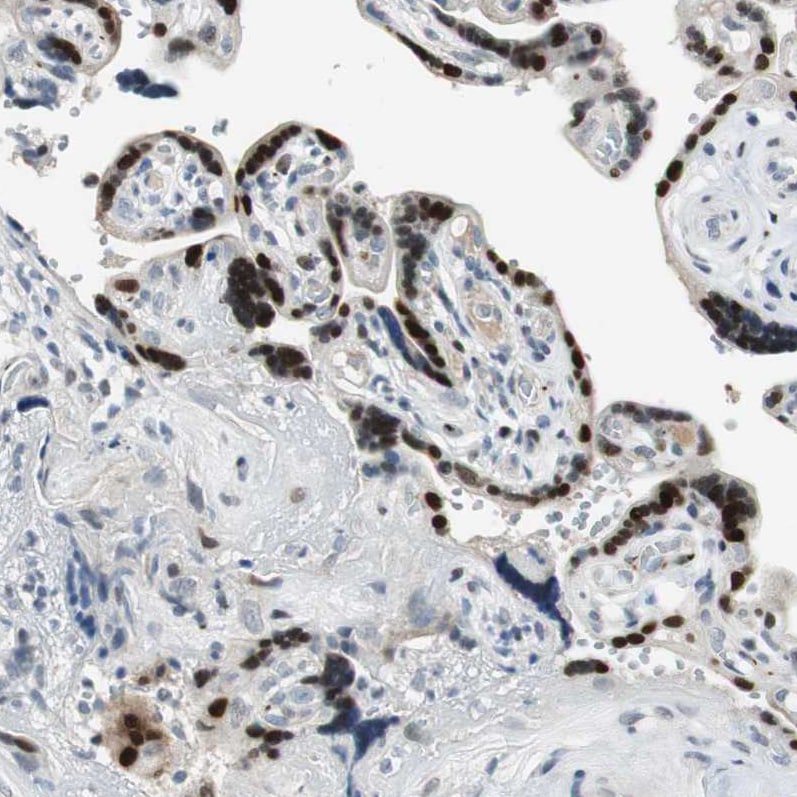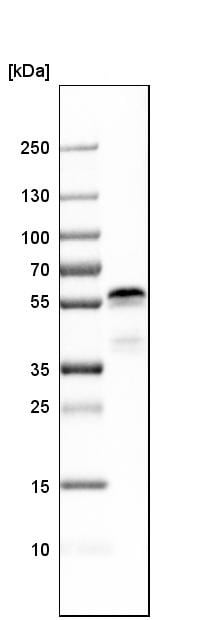Anti-Ajuba antibody (ab244285)
Key features and details
- Rabbit polyclonal to Ajuba
- Suitable for: WB, ICC/IF, IHC-P
- Reacts with: Human
- Isotype: IgG
Overview
-
Product name
Anti-Ajuba antibody
See all Ajuba primary antibodies -
Description
Rabbit polyclonal to Ajuba -
Host species
Rabbit -
Tested applications
Suitable for: WB, ICC/IF, IHC-Pmore details -
Species reactivity
Reacts with: Human
Predicted to work with: Mouse, Cow
-
Immunogen
Recombinant fragment corresponding to Human Ajuba aa 200-350.
Database link: Q96IF1 -
Positive control
- IHC-P: Human esophagus, fallopian tube, kidney, skin and placenta tissue. WB: HepG2 cell lysate; Ajuba overexpression HEK-293T lysate. ICC/IF: U-251 MG cells.
-
General notes
The Life Science industry has been in the grips of a reproducibility crisis for a number of years. Abcam is leading the way in addressing this with our range of recombinant monoclonal antibodies and knockout edited cell lines for gold-standard validation. Please check that this product meets your needs before purchasing.
If you have any questions, special requirements or concerns, please send us an inquiry and/or contact our Support team ahead of purchase. Recommended alternatives for this product can be found below, along with publications, customer reviews and Q&As
Properties
-
Form
Liquid -
Storage instructions
Shipped at 4°C. Store at +4°C short term (1-2 weeks). Upon delivery aliquot. Store at -20°C long term. Avoid freeze / thaw cycle. -
Storage buffer
pH: 7.20
Preservative: 0.02% Sodium azide
Constituents: PBS, 40% Glycerol (glycerin, glycerine) -
 Concentration information loading...
Concentration information loading... -
Purity
Immunogen affinity purified -
Clonality
Polyclonal -
Isotype
IgG -
Research areas
Images
-
PFA-fixed, Triton X-100 permeabilized U-251 MG (human brain glioma cell line) cells stained for Ajuba (green) using ab244285 at 4 µg/ml in ICC/IF.
-
Anti-Ajuba antibody (ab244285) at 0.4 µg/ml + HepG2 (human liver hepatocellular carcinoma cell line) cell lysate
Predicted band size: 57 kDa
-
 Immunohistochemistry (Formalin/PFA-fixed paraffin-embedded sections) - Anti-Ajuba antibody (ab244285)
Immunohistochemistry (Formalin/PFA-fixed paraffin-embedded sections) - Anti-Ajuba antibody (ab244285)Immunohistochemical staining of human Fallopian tube shows strong nuclear positivity in glandular cells.
-
 Immunohistochemistry (Formalin/PFA-fixed paraffin-embedded sections) - Anti-Ajuba antibody (ab244285)
Immunohistochemistry (Formalin/PFA-fixed paraffin-embedded sections) - Anti-Ajuba antibody (ab244285)Immunohistochemical staining of human kidney shows moderate nuclear positivity in cells in tubules.
-
 Immunohistochemistry (Formalin/PFA-fixed paraffin-embedded sections) - Anti-Ajuba antibody (ab244285)
Immunohistochemistry (Formalin/PFA-fixed paraffin-embedded sections) - Anti-Ajuba antibody (ab244285)Immunohistochemical staining of human skin shows moderate nuclear positivity in squamous epithelial cells.
-
 Immunohistochemistry (Formalin/PFA-fixed paraffin-embedded sections) - Anti-Ajuba antibody (ab244285)
Immunohistochemistry (Formalin/PFA-fixed paraffin-embedded sections) - Anti-Ajuba antibody (ab244285)Immunohistochemical staining of human esophagus shows strong nuclear positivity in squamous epithelial cells.
-
 Immunohistochemistry (Formalin/PFA-fixed paraffin-embedded sections) - Anti-Ajuba antibody (ab244285)
Immunohistochemistry (Formalin/PFA-fixed paraffin-embedded sections) - Anti-Ajuba antibody (ab244285)Immunohistochemical staining of human placenta shows strong nuclear positivity in trophoblastic cells.
















